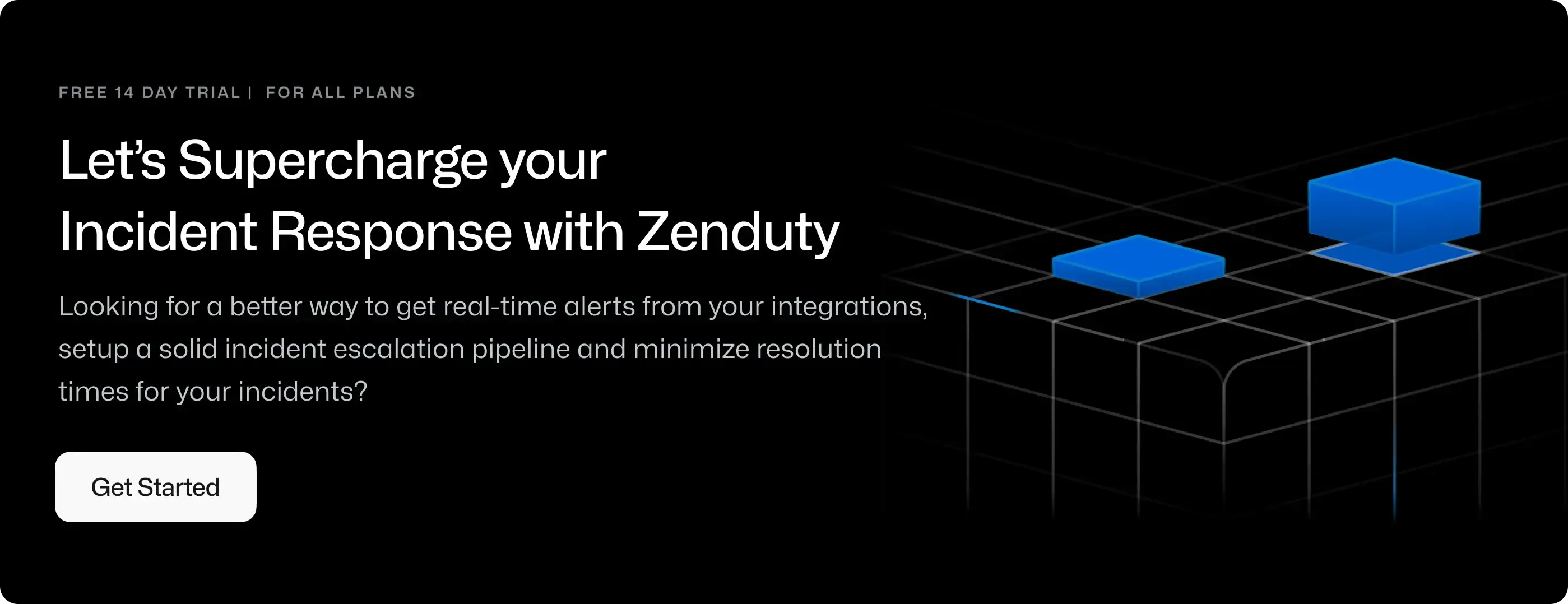Zoho Service Desk
ServiceDesk Plus is a flagship IT service management(ITSM) software with integrated IT asset management, CMDB, problem management, and change and release management, along with robust service desk capabilities. ServiceDesk Plus also includes native project management, and enterprise service management capabilities that enable service delivery management for all departments including those beyond IT such as HR, legal, facilities, and finance.
What can Zenduty do for ZohoServiceDesk users?
With Zoho ServiceDesk’s Integration, Zenduty sends new Zoho ServiceDesk alerts to the right team and notifies them based on on-call schedules via email, text messages(SMS), phone calls(Voice), Slack, Microsoft Teams and iOS & Android push notifications, and escalates alerts until the alert is acknowledged or closed. Zenduty provides your NOC, SRE and application engineers with detailed context around the Zoho ServiceDesk alert along with playbooks and a complete incident command framework to triage, remediate and resolve incidents with speed.
You can also use Alert Rules to custom route specific Zoho ServiceDesk alerts to specific users, teams or escalation policies, write suppression rules, auto add notes, responders and incident tasks.
To integrate Zoho ServiceDesk with Zenduty, complete the following steps:
In Zenduty:
- Go to Teams and click on the team you want to add the integration to.
- Next, go to Services and click on the relevant Service.
- Go to Integrations and then Add New Integration. Give it a name and select the application Zoho ServiceDesk from the dropdown menu.
- Go to Configure under your Integrations and copy the generated Webhook URL.
In Zoho ServiceDesk:
- Login to your Zoho ServiceDesk dashboard using your administrator credentials.

2. Click on the Setup tab located in the top navigation menu. Under the Automation section, click on Custom Action.

3. Navigate to Webhook option under Custom Action. Select the type of event you want to send requests to Zenduty for, and then click on New Webhook to create new webhook action.
4. Fill in the name and description of the Webhook in the respective fields and specify the URL of the webhook endpoint in the URL field. Define the request method as POST in the Method field. Under Message Body select JSON as the type and provide a message body as per your requirements. There are a few fields which are required in the message body in order to create an Incident on Zenduty, those fields are listed further below. Click on Save to save the webhook custom action.

- For Request events, the below fields are mandatory:
{
"subject": "${subject}",
"id": "${id}",
"status": "${status}",
"description": "${description}",
“display_id”: “${display_id}”
}
- For Change, Problem and Release type of events below fields are mandatory.
{
"title": "${title}",
"id": "${id}",
"status": "${status}",
"description": "${description}",
“display_id”: “${display_id}”
}
- For Asset events, the below fields are mandatory:
{
"name": "${name}",
"id": "${id}",
"category": "${category}",,
"type": "${type}",
"state": "${state}",
"department": "${department}",
"product": "${product}",
"user": "${user}",
"product_type": "${product_type}"
}
- For CMDB events, the below fields are mandatory:
{
"ci_type": "${ci_type}",
"name": "${name}",
"description": "${description}",
"id": "${id}"
}
5. In the Automations page, click on the Triggers tab. Select the trigger to which you want to attach the custom action or create a new trigger as required.

6. In the trigger configuration page, scroll down to the Actions section. Click on the Add Action button. From the available list of actions, select the custom webhook action you created earlier. Configure any additional settings or conditions for the trigger as required. Click on the Save button to save the trigger configuration.


7. Zoho ServiceDesk is now Integrated with Zenduty.
Respond to Zoho ServiceDesk Integration alerts faster
Looking for a better way to get real-time alerts from Zoho ServiceDesk Integration, setup a solid incident escalation and incident response pipeline and minimize response and resolution times for Zoho ServiceDesk Integration incidents?
